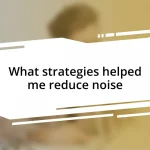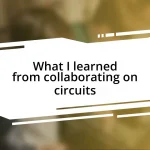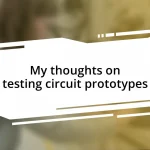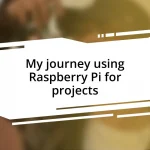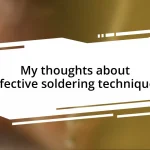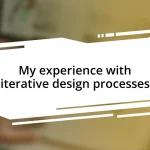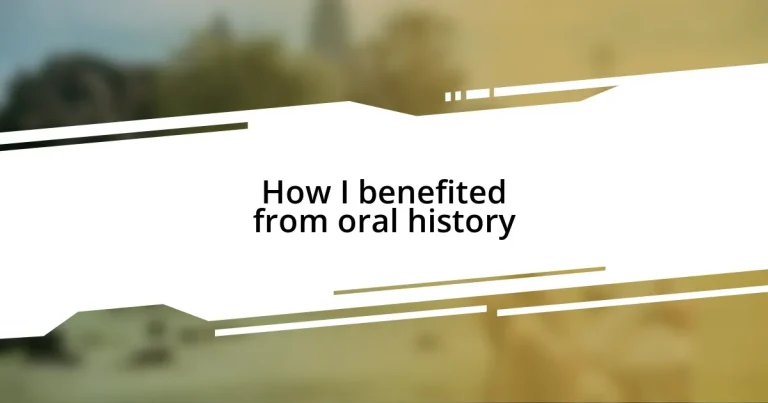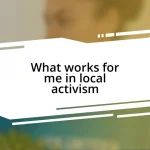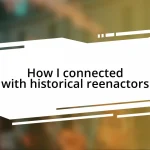Key takeaways:
- Oral history connects generations, revealing cultural heritage and deepening personal identities through storytelling.
- Engaging with oral histories fosters empathy, critical thinking, and a sense of responsibility to preserve narratives from marginalized communities.
- Listening actively enhances personal connections, enabling individuals to understand emotions and shared experiences, transforming conversations into meaningful bonds.
- Applying oral history insights can strengthen community ties, promote social change, and create spaces where cultural narratives are celebrated and preserved.
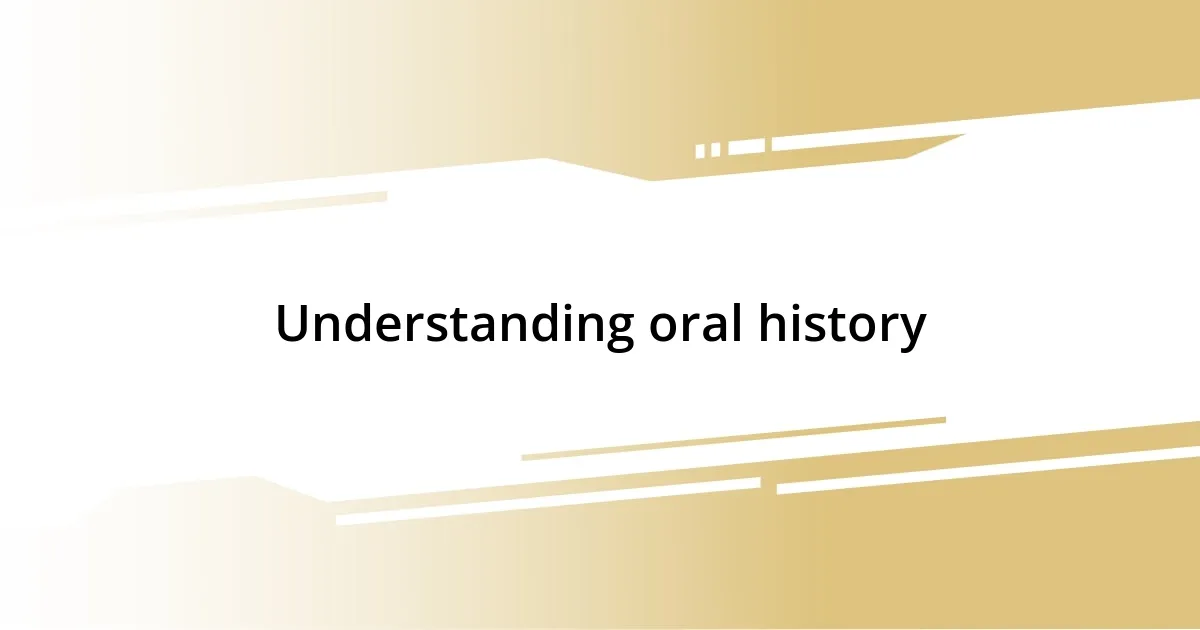
Understanding oral history
Oral history is more than just a collection of stories; it serves as a bridge connecting generations, providing insight into the lived experiences of individuals. I remember sitting around the dinner table, listening to my grandmother recount her childhood during wartime. Her memories weren’t just facts; they were filled with emotion, painting vivid pictures of resilience and hope. Have you ever felt the weight of someone’s history in the words they share?
What fascinates me about oral history is its ability to transform the mundane into the extraordinary. Each conversation I’ve had has unveiled details I never knew existed, revealing the rich tapestry of cultural heritage we often take for granted. It makes me wonder: how often do we miss the stories in our own families?
Engaging with oral history has not only broadened my understanding of the past but also deepened my connections to those who came before me. I’ve felt a profound sense of responsibility to carry these narratives forward, recognizing that they shape not just our individual identities, but our collective memory as a community. Isn’t it empowering to think about how sharing stories can create a lasting impact?
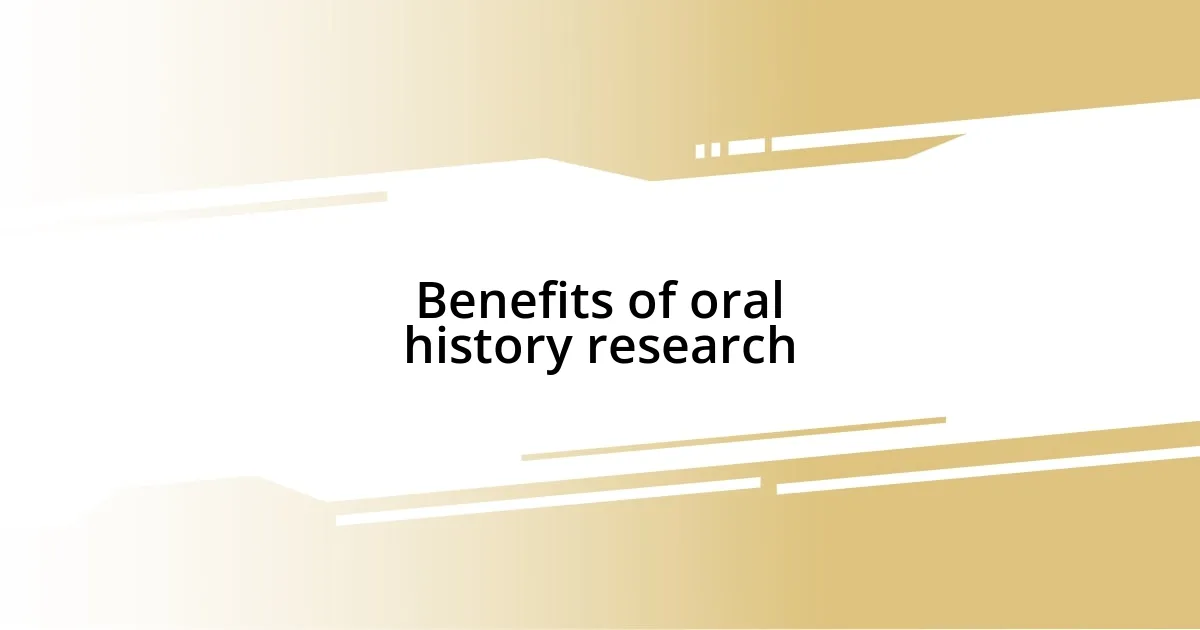
Benefits of oral history research
Engaging in oral history research opens up a world of benefits that extend beyond mere facts and figures. It allows us to connect with the emotions and motivations behind personal narratives, revealing the essence of our shared human experience. I recall a particular afternoon spent with a local elder, listening as she recounted her journey as an immigrant. The struggle and triumph woven into her story left me with a deeper appreciation for the sacrifices made by those who came before us and illuminated the resilience inherent in our communities.
The advantages of oral history research can be profound:
- Human Connection: It fosters empathy and understanding by connecting us with diverse perspectives.
- Cultural Preservation: Oral histories help preserve unique traditions, languages, and customs that might otherwise fade away.
- Critical Thinking: Analyzing these narratives encourages us to think critically about history, questioning dominant narratives and embracing the complexities.
- Empowerment: It empowers individuals from marginalized communities by giving them a platform to share their truths.
Every story is a window into a world you might not have known existed, and I’m continually amazed by the lessons they impart.
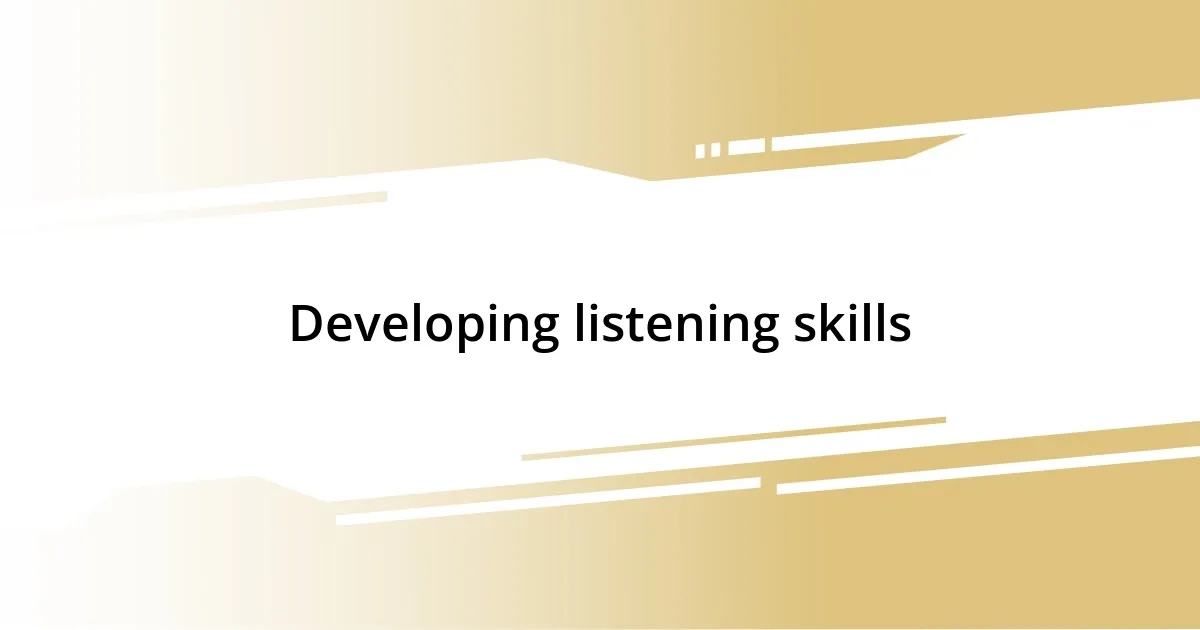
Developing listening skills
Engaging in oral history has profoundly shaped my listening skills. I’ve learned that active listening goes beyond hearing words; it’s about truly understanding the emotions and messages behind them. One time, while recording an interview with a veteran, I found myself captivated not just by his experiences, but by the subtle tremor in his voice when he recounted moments of fear and bravery. That connection taught me to listen not just to what is being said but to the emotions carried within those stories.
I also discovered that patience is essential in the listening process. I remember sitting silently as an elderly neighbor shared her memories, allowing spaces for reflection. Those pauses often led to the most heartfelt revelations, moments I had no idea were brewing beneath the surface. Through this experience, I realized that sometimes the most powerful insights come when we create room for the storyteller to breathe and think.
Moreover, the practice of listening to diverse life stories has sharpened my ability to empathize. It’s amazing how immersing oneself in another’s narrative can shift your perspective. After interviewing a young woman who overcame significant challenges, I found myself more compassionate towards struggles I had previously perceived as trivial. Each story serves as a reminder of our shared humanity, reinforcing the idea that effective listening can truly change the way we relate to one another.
| Listening Skill | Personal Experience |
|---|---|
| Active Listening | Understanding emotions behind words |
| Patience | Allowing moments for deep reflection |
| Empathy | Shifting perspective through shared narratives |
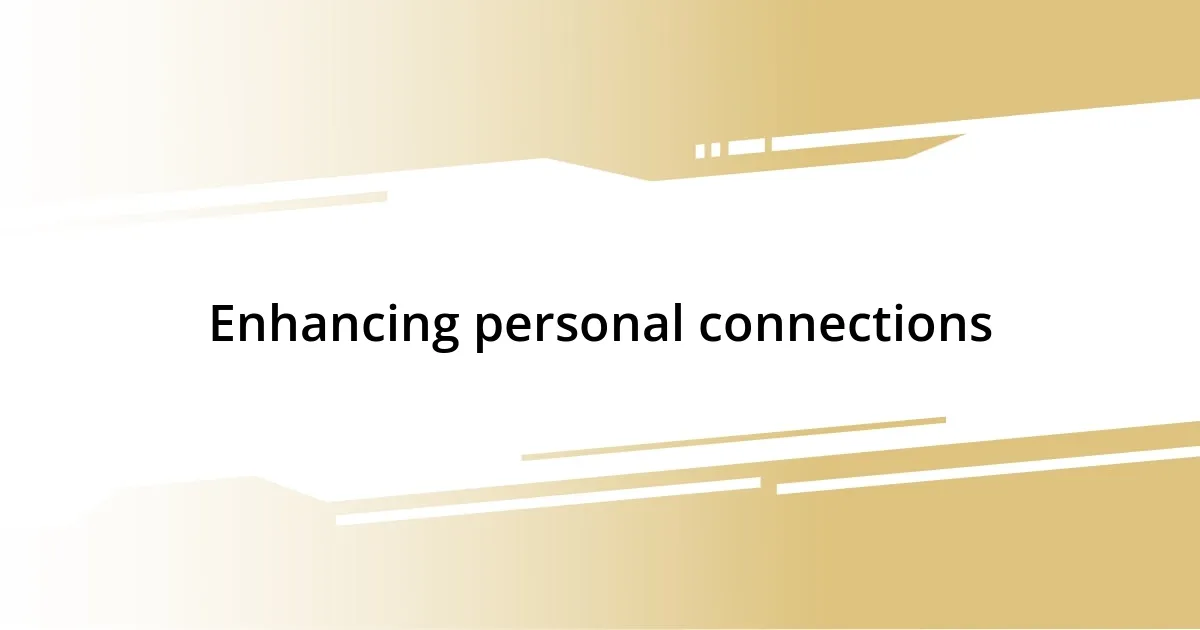
Enhancing personal connections
Engaging with oral history has profoundly enriched my personal connections with others. One afternoon, I found myself sitting on the porch with a neighbor, who shared her story of losing her childhood home to a flood. As the sun set and she spoke about her feelings of loss mixed with hope, I realized how her narrative echoed the struggles many of us face, creating an unspoken bond between us. Isn’t it fascinating how such intimate stories can bridge the gap between strangers?
When I reflect on these experiences, I often wonder how many other untold stories surround us daily. I remember a moment with a local farmer who talked passionately about his traditions, illuminating a lifestyle I had taken for granted. Listening to him not only deepened my understanding of his sacrifices but also sparked a sense of gratitude within me for the everyday heroes in our lives. How often do we overlook the rich histories woven into our own communities?
The impact of oral history extends beyond mere conversation; it transforms the way we connect with one another. One evening, after interviewing a woman who had navigated tremendous hardships, I felt compelled to check in on my own family. Her story served as a powerful reminder of the importance of nurturing relationships and cultivating empathy within our circles. Isn’t it incredible how one shared story can ripple outwards, prompting us to reconnect and strengthen our bonds?
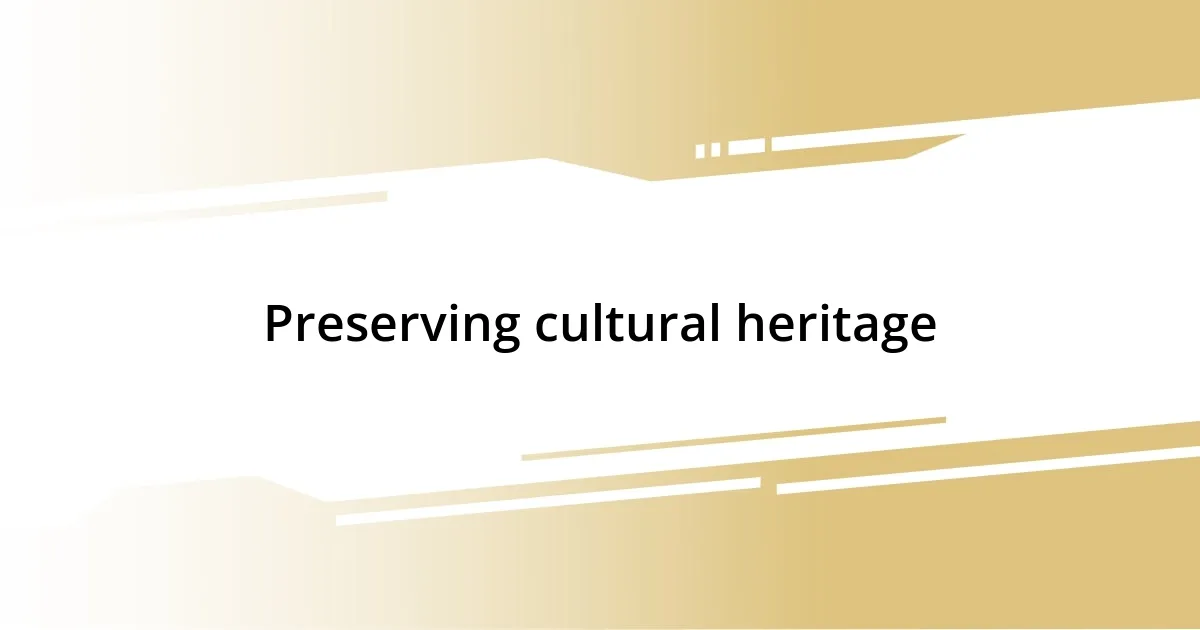
Preserving cultural heritage
Engaging in oral history has provided me a unique window into preserving cultural heritage, and I’ve come to realize how vital these stories are. One delightful Sunday afternoon, I attended a community gathering where an elder shared folk tales from our region’s past. As I listened to tales about traditional festivals and customs that have faded over time, I felt a profound sense of responsibility to preserve these narratives. Isn’t it amazing how these stories can keep our cultural identity alive?
I vividly remember the excitement I felt when I volunteered to document the stories of local artisans. One craftsman spoke so passionately about the techniques passed down through generations, detailing not just the methods, but the spirit behind his work. Hearing him connect his craft to the history of our community truly reinforced how oral history isn’t just about the past; it cultivates a rich sense of belonging in the present. How often do we consider the impact of preserving these artistic legacies?
What strikes me the most is how oral history fosters a living culture. One experience I cherish is gathering around a fire with young people in my community as elders recounted bedtime stories filled with morals and wisdom. Those moments ignited not only laughter but curiosity in the next generation. It was heartwarming to see how they engaged, absorbing pieces of their heritage that might otherwise fade away. Isn’t that the beauty of storytelling? It binds us together and ensures that the rich tapestry of our culture remains vibrant and dynamic for years to come.
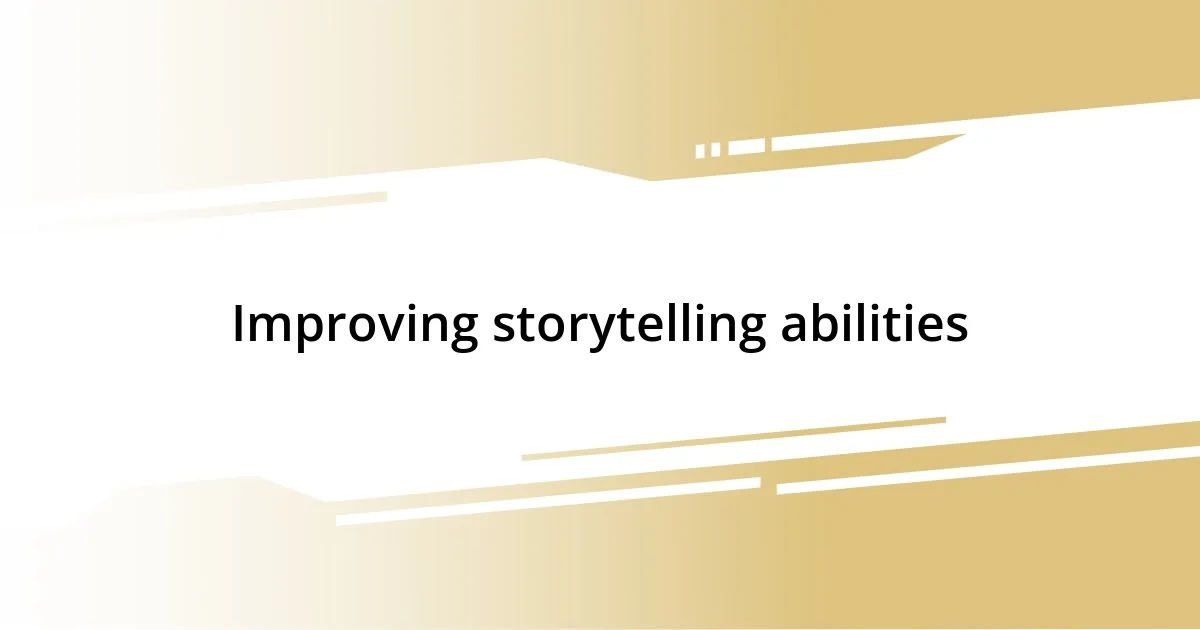
Improving storytelling abilities
Engaging in oral history has truly sharpened my storytelling abilities in ways I hadn’t anticipated. I distinctly remember an afternoon spent with a retired teacher who shared captivating anecdotes from her classroom. Listening to her make the mundane magical through vivid details, I realized how essential it is to weave emotion and context into our narratives. Don’t you think the art of storytelling lies in its ability to transport us into someone else’s shoes?
One evening, as I recounted a childhood memory during a storytelling circle, I felt the room’s energy shift. The way I painted the scene—a rainy day spent building a fort—sparked laughter and nostalgia among my listeners. This interaction taught me that engaging storytelling is about creating connections through shared experiences. I often ponder how our stories can become a bridge, transforming simple recollections into heartfelt moments of unity, don’t you agree?
Reflecting on my journey through oral history, I recognize how I’ve become more intentional in my storytelling approach. When I recently gathered stories from a local veterans’ group, the significance of pauses and inflections stood out to me. Each soldier’s tale carried weight, and the emotions behind their words prompted me to adapt my storytelling style accordingly. Isn’t it liberating to recognize how mastering this craft can deepen our connections with diverse audiences?
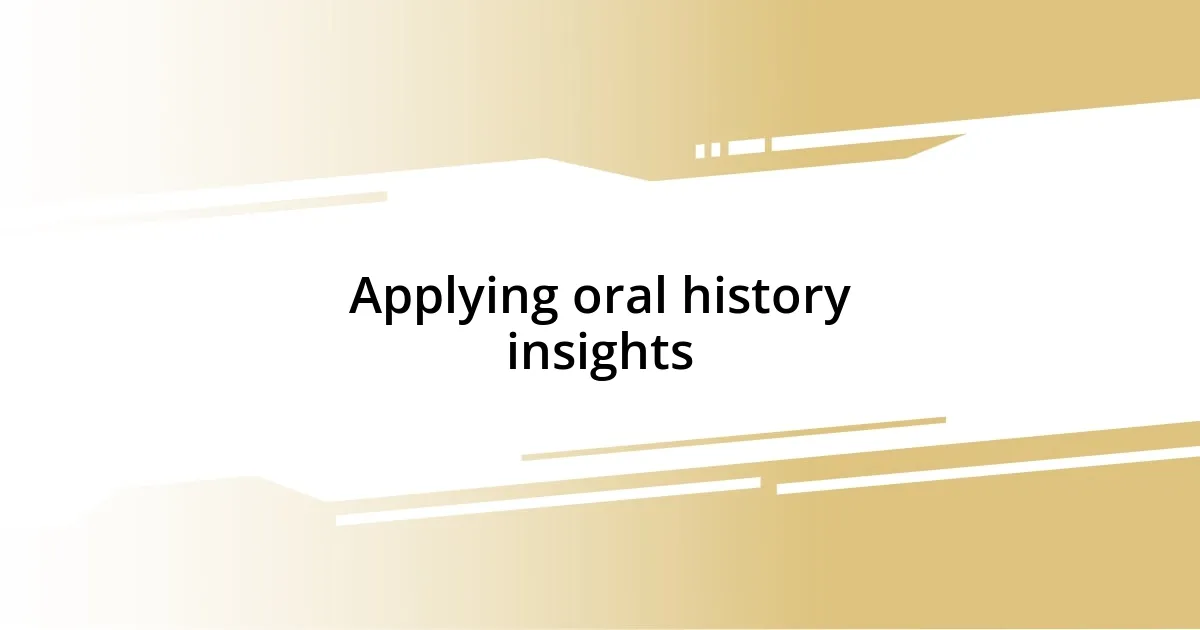
Applying oral history insights
Applying the insights I’ve gained from oral history has truly transformed how I approach my engagement with the community. I remember sitting down with a group of young adults eager to learn about local history. As I shared stories from my own upbringing, I noticed their eyes lighting up with curiosity. It struck me that these narratives were not just lessons; they were bridges connecting generations. Could the act of sharing stories be one of the most effective ways to deepen our communal ties?
One memorable instance involved creating a project that centered around local traditions, drawing from the oral histories I had collected. I organized a small exhibit showcasing photographs paired with personal stories from the elders in our town. Watching visitors react to these displays, their emotions reflected in smiles and tears, reminded me of the power these shared experiences hold. This project demonstrated that when we apply oral history insights thoughtfully, we create spaces where heritage thrives and resonates with everyone. Isn’t it fascinating how stories can evoke such strong emotional responses and turn strangers into friends?
I also learned to embrace storytelling as a tool for social change through the oral histories I’ve encountered. By facilitating workshops where community members shared their hardships and triumphs, I witnessed firsthand the healing power of narratives. One participant spoke about overcoming adversity, and her story inspired others to share similar experiences. This dialogue reinforced my belief that sharing personal narratives can help us collectively address social issues, building empathy and understanding within our community. Can you imagine the ripple effect this could create if we all took the time to listen to one another’s stories?

